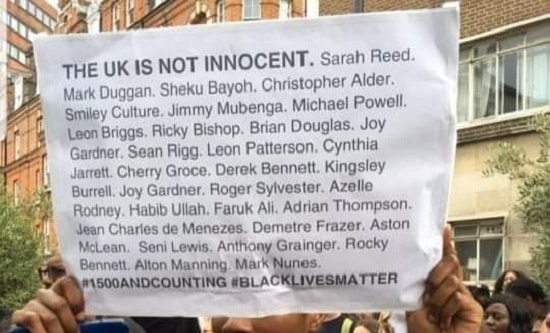
The stark racial disparities cannot be denied. People who identify as black, Asian, or another ethnic minority (considered together as BAME) constitute around 14% of Britain’s population, but they accounted for 34% of those who required intensive care due to Covid-19 up to 14 May.* When taking into account differences of age and geography, black people are dying at four times the rate of white people; other ethnic minorities are also disproportionately affected.
While many attempts have been made to explain this away, as the result of the effect of Vitamin D on the immune system or ‘lifestyle’ factors, the Office for National Statistics estimates that at least half the ethnic difference in Covid-19 death rates can be explained by socioeconomic differences. The primary cause is structural, shaped by high rates of poverty that contribute to long term health conditions, and concentrations of BAME workers in jobs that leave them disproportionately exposed to the virus.
Exposure to the virus
Overall, BAME workers are more likely to be employed in so-called ‘low skilled’ jobs – a euphemism for low-paid and low-status – that often cannot be performed from home, and in sectors that have continued to operate throughout the pandemic. For example, 44% of black people work in jobs classified as ‘public administration, education and health’, compared to 31% of white British people, and 16% of Asian people work in ‘Transport and communication’, compared to 8% of white British people.
Covid-19 death rates among care workers, sales assistants and bus drivers are all more than double that of the general workforce, while the rates for taxi drivers and chefs are more than triple, and security guards more than quadruple.
A 2019 TUC study found that BAME workers are twice as likely to be in precarious employment, including on zero hours and agency contracts, as their white counterparts. This means they are less likely to have the financial security needed to self-isolate if needed, or to stay away from work that is unsafe. Another study found that BAME millennials were 47% more likely to be on zero-hours contracts. This means that BAME workers are less likely to qualify for government wage support schemes, mortgage-holiday packages, statutory sick pay, holiday pay or Universal Credit, and consequently are more likely to be forced to continue working because of economic necessity, increasing their risk of exposure to the virus. Thousands of migrant workers face the threat of deportation if their annual income falls below the threshold set by the government of £18,600. At the end of April, immigration minister Kevin Foster suggested those who lose their jobs should rely on ‘investments and cash savings’ to make up the difference, but this is impossible for many working-class migrants. Prior to the lockdown nearly 60% of Britain’s adult population had enough savings to cover at least one month of lost income, but among people of Bangladeshi, black Caribbean or black African ethnicity only 30% had this level of savings.
The NHS and social care providers are particularly reliant on BAME and migrant labour. In 2018, 7% of people born in the UK worked in the health sector, but 14% of Indian migrants in Britain did so, alongside 13% of Sub-Saharan African migrants, and 16% of East and Southeast Asian migrants. For Social Work and Residential Care, the figures were 6% for those born in the UK and 13% for those born in Sub-Saharan Africa. 20% of the overall NHS workforce is BAME. BAME workers and migrants disproportionately occupy lower-paid and over-worked roles in the NHS and its out-sourced support services. Research published in the Health Service Journal found that among a sample of 203 reported deaths of healthcare workers involving Covid-19, 95% were staff who worked in patient-facing roles, and 63% of deaths were from a BAME population. 22% of nurses who died were from the Philippines, 12% from Zimbabwe and 6% from Nigeria.
The health of BAME workers
The higher rates of serious illness and death among BAME people who contract coronavirus can be explained to a significant extent by the higher rates of long-term underlying illnesses. Type 2 diabetes is particularly significant, affecting around 6% of the UK population but present in one third of Covid-19 deaths. African and African-Caribbean people are three times more likely to suffer from Type 2 diabetes, and South Asian people six time more likely. Ethnic health inequalities are particularly marked among those over 60, who are particularly vulnerable to Covid-19.
Social murder
The racist structure of British society, rooted in Britain’s parasitic relationship with other countries, impacts on BAME workers from the day they are born or arrive in Britain, subjecting them to exploitation, while denying the resources to live healthy lives. Immigration controls limit the rights of workers from other countries, particularly those from economically underdeveloped countries, forcing them to endure extremes of exploitation. British capitalism relies on the labour of BAME and migrant workers for many critical roles, which in times of pandemic are also some of the most dangerous. Capitalism’s perversity is revealed in the way these socially essential workers are treated, with low pay and precariousness further increasing their vulnerability. Their death certificates may say ‘Covid-19’, but the real killer is racist British capitalism.
Tom Vickers
* Figures compiled by the Intensive Care National Audit and Research Centre.
Fight Racism! Fight Imperialism! No 276, June/July 2020




